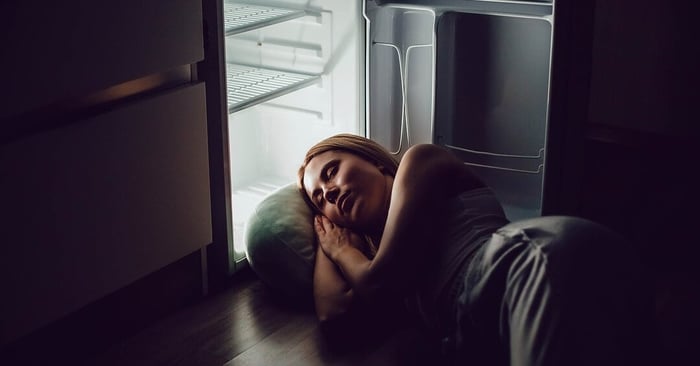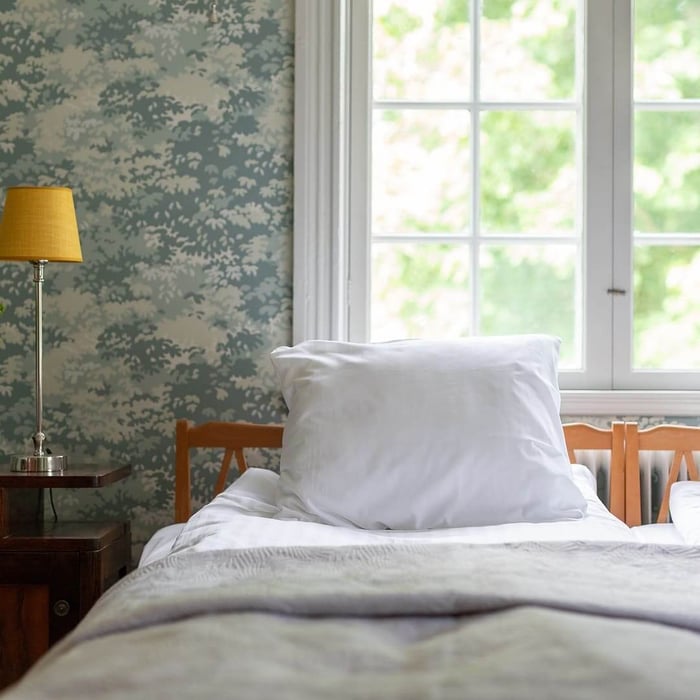Table of Contents
- Quick verdict
- Who this is for / not for
- Where Night Sweats Actually Ease
- Night sweats in women are common — and usually manageable
- Why night sweats happen in women
- Night sweats vs hot flashes
- Why “cooling bedding” often fails at 3 a.m.
- What people mean by “sleep microclimate” — in plain English
- Why bedding matters more for women
- What actually helps — and where relief happens
- When to check in with a professional
- Final takeaway
- FAQs on Wool Duvet Inserts, Comforters & Sustainable Bedding
Quick verdict
Night sweats in women are usually sparked by hormonal shifts — but what decides how bad they feel is what you’re sleeping under.
When bedding traps heat and moisture, small, normal temperature changes turn into full‑body overheating.
You fall asleep fine… then wake up hot, damp, or suddenly freezing. Relief only happens when that trapped pocket of heat and humidity — what sleep science calls the sleep microclimate — stops working against your body.
Who this is for / not for
For: women waking up sweaty or clammy at night, struggling with temperature swings during perimenopause, menopause, postpartum, or stressful life phases — especially if the room itself isn’t hot.
Not for: night sweats paired with fever, unexplained weight loss, or symptoms that feel new and alarming. Those always deserve medical attention first.
Where Night Sweats Actually Ease
Organic Wool Comforter — designed to help reduce night sweats by releasing heat and moisture through the night, rather than trapping humidity the way synthetic or down‑alternative fills often do.
Organic Wool Comforter

$342.00
$380.00
Our organic wool comforter is designed to keep you dry, balanced, and deeply comfortable all night. Unlike down or synthetic comforters that trap heat, our spun wool design wicks away moisture and prevents overheating, so you stay cool & dry.… Read more
Why this matters when you sleep hot:
Helps prevent that sticky, damp feeling that wakes you up
Releases excess heat gradually instead of rebounding at 2–4 a.m.
Stays breathable during hormonal temperature swings
Night sweats in women are common — and usually manageable
If night sweats are waking you overheated, restless, or exhausted, you’re not imagining it — and you’re not alone. For many women, these episodes aren’t a sign that something is “wrong.”
They’re often the result of temporary hormone changes colliding with bedding that holds onto heat and moisture.
This is where most advice falls short. Night sweats aren’t always just a body issue. Your body may start the heat surge — but your bedding decides whether it settles… or spirals.
This guide breaks down:
Why women experience night sweats more often
Why bedding quietly makes symptoms worse
Why many cooling fixes stop working overnight
Where real relief actually happens
Why night sweats happen in women
Most cases fall into one (or more) of these buckets.
1) Hormonal changes (the spark)
Hormones help regulate your internal thermostat. When estrogen or progesterone shifts, that thermostat can become overly sensitive — reacting to tiny temperature changes with sudden heat release.
This commonly shows up during:
Perimenopause and menopause
Menstrual cycle changes
Postpartum hormone shifts
Thyroid fluctuations
Hormones flip the switch. They don’t control how intense the night becomes.
(For a deeper breakdown of how heat and moisture build up in bed, see Why Hot Sleepers Wake Up Sweaty.)
2) Bedding and sleep setup (the amplifier)
This part is often overlooked.
Many comforters and sheets — especially synthetic fills and tightly woven fabrics — trap moisture vapor. Once humidity builds up under the covers, your body struggles to cool itself.
That’s why night sweats often follow a familiar pattern:
You feel comfortable falling asleep
A few hours pass
You wake up overheated, clammy, or throwing the covers off
If that sounds familiar, your bedding may be making the reaction stronger than it needs to be.
3) Lifestyle stressors (the nudge)
These don’t usually cause night sweats on their own, but they can push an already sensitive system over the edge:
Alcohol in the evening
Heavy or spicy dinners
Stress and elevated cortisol
Overly warm sleepwear
Night sweats vs hot flashes
Hot flashes are sudden waves of heat that can happen anytime
Night sweats happen specifically during sleep
Many women experience both. Younger women may notice night sweats without any daytime symptoms at all. Knowing the difference helps you focus on nighttime factors — not just daytime cooling tricks.
Why “cooling bedding” often fails at 3 a.m.
Most products marketed as cooling focus on how the bed feels at first.
They may feel cool to the touch — but they still trap moisture underneath. As humidity builds:
Airflow slows
Sweat lingers on the skin
Heat rebounds
Sleep gets disrupted
That’s why gel foams, phase‑change fabrics, and down alternatives often stop working halfway through the night.
(This mechanism is explored further in Why Cooling Bedding Stops Working Overnight.)
What people mean by “sleep microclimate” — in plain English
Your sleep microclimate is simply the pocket of air between your body and your bedding.
When that space stays dry and breathable, your body can release heat naturally. When it becomes warm and humid, even small temperature changes can trigger sweating.
Why bedding matters more for women
Hormonal temperature shifts can rise and fall quickly. Fabrics that cling to moisture or hold heat tend to magnify discomfort — especially during the night.
Synthetic fills, microfiber, and down alternatives often:
Create a humid heat bubble
Release warmth slowly
Leave you chilled after sweating stops
Breathable natural fibers that stay dry help soften those swings, even when hormones fluctuate.
What actually helps — and where relief happens
Night sweats don’t ease by forcing your body cooler. They ease when the sleep setup stops fighting your natural temperature regulation.
That relief doesn’t happen in tips or tricks — it happens when the materials around you release heat and moisture instead of trapping them.
👉 See the wool comforter engineered to release heat and humidity rather than hold it in.
When to check in with a professional
Always speak with a healthcare provider if night sweats are:
Persistent and worsening
Paired with fever or unexplained weight loss
Sudden and unusual for you
For many women, though, understanding the role of bedding explains why symptoms feel worse at night — and why they often improve when the environment changes.
Final takeaway
Night sweats in women often begin with hormones — but how disruptive they become depends on what’s happening in bed.
When bedding traps heat and moisture, normal temperature changes turn uncomfortable. When that trapped heat is released and the bed stays dry, the body settles.
Understanding the cause narrows the path. Relief happens where the environment changes.
FAQs on Wool Duvet Inserts, Comforters & Sustainable Bedding
Are night sweats in women always related to hormones?
Not always. While hormonal shifts are the most common trigger, night sweats in women can also come from medications, thyroid issues, stress, infections, or even eating certain foods before bed. If symptoms appear suddenly or feel severe, it’s worth talking to a healthcare professional to rule out other causes.
Can certain foods make night sweats worse?
Yes. Spicy foods, alcohol, caffeine, and heavy late-night meals can all raise core body temperature and worsen night sweats in women. Many women notice fewer episodes when reducing evening alcohol or swapping hot meals for lighter, cooling foods.
Does dehydration contribute to night sweats?
It can. When the body is mildly dehydrated, your internal temperature can run hotter, which increases the likelihood of overheating at night. Staying hydrated throughout the day helps your system regulate temperature more effectively.
Are night sweats common in younger women?
Yes. Even though they’re usually associated with menopause, many younger women experience night sweats tied to stress, birth control changes, postpartum recovery, or menstrual cycle shifts. Hormones aren’t age-exclusive.
Can sleeping position affect night sweats?
Sleeping curled up or under heavy blankets can trap heat around your core. Side and back sleeping positions usually allow for better airflow, which can help reduce overheating at night.
Do supplements help reduce night sweats in women?
Some women find relief from supplements like magnesium, evening primrose oil, or black cohosh, though results vary. Always check with a healthcare provider first, especially if you’re taking medications or navigating perimenopause.
Can night sweats affect heart rate or sleep cycles?
Yes. Overheating can trigger micro-awakenings, increase heart rate, and prevent the body from entering deep, restorative sleep. This is one reason why night sweats and women often correlate with daytime fatigue and irritability.
Are night sweats worse during stressful life transitions?
Definitely. Emotional stress raises cortisol — your fight-or-flight hormone — which increases core body temperature. During periods of anxiety, big changes, or overload, many women notice more frequent night sweats.
Do medications for anxiety or depression trigger night sweats?
Certain antidepressants, SSRIs, and anxiety medications list sweating or temperature changes as side effects. If symptoms began after starting a medication, speak with your doctor about alternatives or timing adjustments.
When should women worry about night sweats?
If night sweats are persistent, extreme, come with fever or weight loss, or appear suddenly with no clear cause, it’s best to speak with a doctor. While most cases are harmless, persistent overheating at night can sometimes signal an underlying condition that needs attention.




